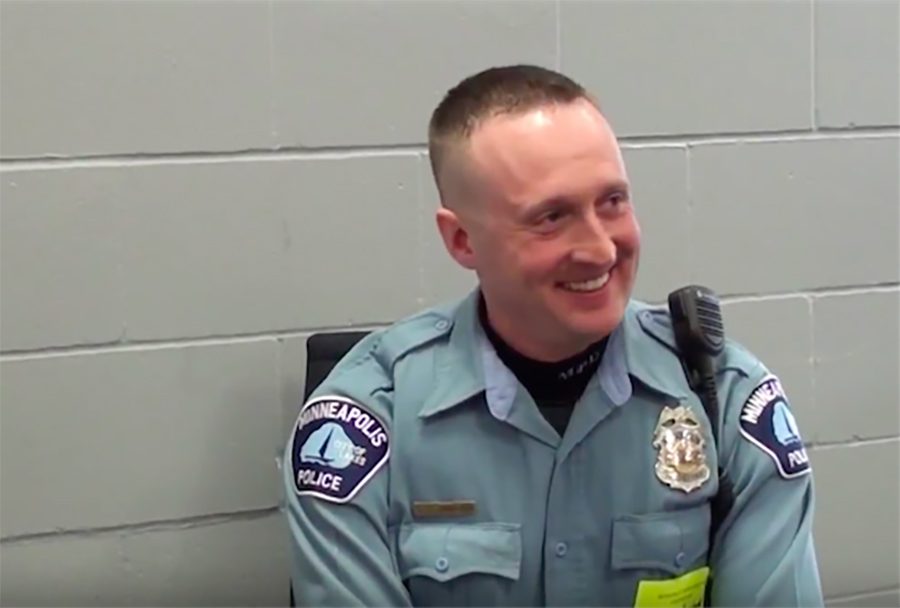BSM alum John Haugland: giving police work his best shot
BSM alum John Haugland now serves as a K9 officer and a Swat team officer on the Minneapolis police force.
As a college prepatory school, most students graduate from BSM with plans to further their education at a university of their choice. However, some students already know what career they want to go into, and pursue that career after graduation. John Haugland, a BSM alumnus, is one of these few. “It was one of those things: when [I was] a kid, I always wanted to be a police officer, and I never grew out of it,” Haugland said.
Many factors have contributed to his success as an officer with the Minneapolis Police department, one of those being BSM. During his time at BSM, Haugland worked with the administration so that he could be involved with a Police Explorers program. This allowed him to further his interest in police work while still enrolled in high school. Like student athletes, who miss school to practice, Haugland received accommodation to participate in the Explorer program. “Every year I was in Police explorers, we had to go to a state conference and I had to miss two days of school. Mary Anderson made it so that didn’t count against me for skipping a final. That was my ‘sport,’ so [BSM] worked with me, because I knew that’s what I wanted to do,” he said.
Haugland was hired by the Minneapolis Police department almost immediately out of high school— initially as a community service officer. He then attended the Minneapolis Police Academy in 2005, where he became a patrol officer. Since then, he has held a number of unique positions within the Department, one of those being a K-9 officer, a position he still holds.
Haugland went through the K-9 officer training program last year, where he met his partner, a German Shepherd named Beau. The program consisted of 16 weeks of training, in which Haugland and Beau bonded and learned to work together. “You’re running right alongside of the dog, lifting him over things, doing a lot of physical activity. You definitely have to stay in shape. It’s a very active job.” Haugland said. Now he and Beau patrol together everyday, and the two are practically inseparable: “I am probably with Beau more than I’m with my wife,” Haugland said.
In addition to being a trained K-9 handler, Haugland has been a member of the department’s SWAT Team, which he joined six years ago. After completing a highly-competitive selection program, Haugland was selected to become a member of the unit.
On a typical work day, Haugland wakes up and plays with Beau before putting on his uniform and heading to work. He reports to the K-9 Kennel at the fourth precinct in Northeast Minneapolis, checks his info board, and makes sure that every officer’s dog has been taken care of. He plays with and feeds dogs whose handlers are off shift that day, then heads out on patrol. Haugland normally works from 3 p.m. until 12 a.m., doing K-9 police work all over Minneapolis. “I can do proactive stuff, which means traffic stops, suspicious persons stops, and then also certain calls like burglaries and residential alarms that will actually get dispatched by our radio, telling us where they want us to go to use a dog,” Haugland said.
In addition to his usual duties as a patrol officer, Haugland has to demonstrate additional dedication as a SWAT officer, doing extra training, and working with the department’s warrant service. “Three months out of the year most [SWAT officers] will be at what’s called high-risk warrants service. It’s where a lot of the investigative units and other non-uniformed spots in the department will use us to serve high-risk search warrants. High-risk means there’s known threats of people with violence or weapons. In those months, anything can happen. We’re on call that entire time,” he said.
While he enjoys his work, Haugland’s job requires him to face adversities on a daily basis. “The biggest challenge in today’s policing would be dealing with the media and all the negative light that has come into press with our job, and trying to keep a positive attitude. It’s still a good job, you just have to battle through the negatives that are thrown at you. When you’re a police officer, you are in the spotlight the entire time. You have to remember that, and try and operate knowing that if you do something, it could stick with you,” Haugland said.
Additionally, Haugland faces enforcing law on people at a low point in their lives. “Dealing with people on certain calls, you do intervene on a lot of negative parts of people’s lives,” Haugland said. Oftentimes when a citizen has an encounter with police, they may be struggling financially or emotionally, which usually ties into the crime committed.
Despite challenges, Haugland believes that the rewards of policing outweigh the negatives. “The most rewarding part is working with the guys. The camaraderie, the team aspect of the job. It’s huge. Everything that makes it good is being in the team atmosphere and being around good guys. We’re a tight-knit family,” Haugland said.
One of Haugland’s favorite parts of his job is seeing the positive impact he makes in his community. “Probably one of the most rewarding deals I’ve been involved in was a kid in North Minneapolis that was on his way home from school, got robbed, and they took his cell phone and iPad. I work an extra job in police capacity at Target, and I was able to get them to donate stuff to this kid, who had some special needs. [He] was really upset that he lost all of this stuff, but, I was able to get it replaced, and I had the SWAT guys come out with me and we brought them to his house. He was pretty excited about it, so, you do see some good in it,” he said.
As for students who want to be police officers, Haugland recommends staying in school and he stresses that it is important to do well and get good grades. “If it’s something that you want to do, I would say pursue it; this is a job that unless you do it, you’re never going to really satisfy that bug to be a police officer,” said Haugland.
Police work is specialized because there are so many different paths that can be taken. Potential officers need to decide what type of police work they want to pursue, if they are going to work at a state, local, or federal level, and decide what kind of environment they want to work in (city, suburb, etc.). “There are a lot of opportunities within our department to do different things, such as: K9, SWAT team, mounted patrol and narcotics type of stuff,” said Haugland. Many departments now require a four year degree to be considered for a position. “If you’re fresh out of high school, and you’re wanting to go to college, I would say to go for a four year degree,” said Haugland.





































![Teacher Lore: Mr. Hillman [Podcast]](https://bsmknighterrant.org/wp-content/uploads/2025/03/teacherlorelogo-1200x685.png)




